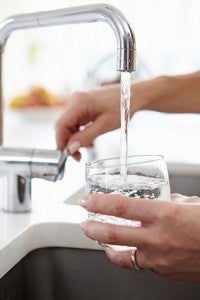 Staying properly hydrated is incredibly important – especially when it comes to kidney function and overall health.
Staying properly hydrated is incredibly important – especially when it comes to kidney function and overall health.
Water = A Necessary Nutrient
We need water to make our bodies work well. Think of it as a nutrient that your body needs in order to function properly. For example – did you know that we lose a large amount of fluid every day from sweat, urine, bowel movements, and breathing?
Drinking enough water keeps our kidneys healthy, makes our bowels function more regularly, makes our skin look better, our muscles work better, and it can even help with calorie control. From a urology perspective, lots of water also helps protect against UTIs and kidney stones.
The body is comprised of at least two thirds water, so dehydration can cause poor function of many organs. Dehydration can also lead to heart issues, kidney issues, mental sluggishness and fatigue.
How much water should we consume?
The amount of water you consume really depends on your size, weight and activity level. Most people should aim for 6-8 eight ounce glasses of water a day, but the range is anywhere from 1/2 ounce to one ounce per pound – more if you are very active or live in a hot climate. For kidney stone patients, we recommend 2-2.5 liters of water a day.
What if I’m experiencing frequent urination?
Frequent urination can be a sign of an overactive bladder, or an issue with the kidneys. Be sure to seek medical attention if you feel like you are urinating too frequently.
Water Consumption & Your Kidneys
Our kidneys are two fist sized organs located under our rib cage in the back. Kidneys filter our blood and get rid of waste products and extra water.
Drinking enough water keeps your kidneys functioning properly, and it allows them to appropriately do their job of getting rid of waste products. Poor water consumption can cause kidney stones. Quick ways you can keep your kidneys healthy include: staying properly hydrated, exercising regularly, eating a healthy diet, and taking it easy when consuming over-the-counter (OTC) meds.
Signs of Poor Kidney Function
Outside of making sure that you’re properly hydrated, there are some telltale signs that may indicate kidney issues or even kidney disease. These include:
- Nausea
- Vomiting
- Loss of appetite
- Fatigue and weakness
- Sleep problems
- Changes in urine output
- Decreased mental sharpness
If you have any unusual symptoms, or if you suspect that something bigger may be going on, consult with your doctor.
About Ann Becker, MD
Dr. Ann Becker is board certified in Urology and, within the American Board of Urology, she has earned Diplomate status. A native of Baltimore, MD, she attended McDonogh High School in Owings Mills, MD, before heading to Virginia for college.
